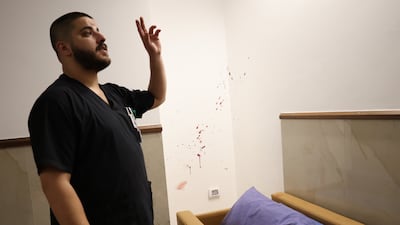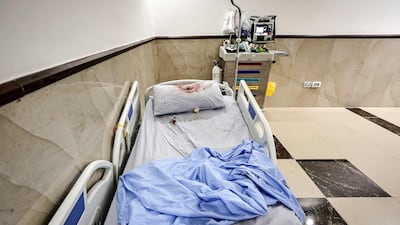A “crime against hospitals” that “violated the sanctity of the doctors’ and nurses’ uniforms”. This was the reaction of Wissam Subeihat, health director of Jenin, to the deadly raid on the West Bank town’s Ibn Sina Hospital carried out by an Israeli hit squad disguised as medics and civilians earlier this week.
The details make for grim reading. A staff member at Jenin’s Ibn Sina Hospital told The National how a young woman on the reception desk of the clinic’s rehabilitation ward unwittingly buzzed in one of the disguised assailants before being struck with a gun. The room was quickly filled with more armed troops, dressed as patients, medical staff and family members. Three Palestinian men, including a patient, were gunned down.
The Palestinian news agency Wafa named the three dead as Mohammed Jalamneh, 27, Mohammed Ghazzawi, 23, and his brother Bassel, 18, who was being treated for a spinal injury that had left him paralysed. The Israeli army says its operatives were after Mr Jalamneh, who it alleged was planning an attack on Israel and had been in contact with Hamas headquarters abroad.

No doubt these extrajudicial killings will be interpreted by some as a daring feat. This would be a facile understanding; turning a hospital into a theatre of war reveals a moral and operational decay in Israeli military tactics that promises to only exacerbate the conflict.
For years, Israeli representatives have accused Hamas of using Gazans as human shields. Yet, dressing troops up as medics to execute three suspects puts every Palestinian doctor and nurse at risk and proves that hospitals are indeed regarded as fitting sites for combat and killing. Even from a security standpoint – and Israel will have its own rationale for the Jenin raid – if Hamas is regarded as a criminal organisation and not as an army, then why were the three men not detained and questioned over their alleged activities?
Israel’s military has been described by some as the “most moral army in the world”. But by storming a clinic, terrifying civilians and shooting suspects dead, its actions cannot be defended, just like those of its Hamas enemies who also have a grisly history of summarily executing opponents or alleged collaborators.
Operations such as that witnessed in Jenin also risk repeating the mistakes of the past. Comparable operations – for example, the series of Mossad-led assassinations after the 1972 Munich massacre – may have set back Palestinian militants, but they failed to establish lasting security for Israelis.
Indeed, by repeatedly exacting revenge in ways that are guaranteed to fuel more anger and grievance among the Palestinian population, the seeds of vengeance and radicalisation are sown – even overseas. In a week when the head of Doctors Without Borders in the Palestinian territories described the Israeli bombing of Gaza as “indiscriminate”, in neighbouring Lebanon a Hamas recruiter told The National that, owing to anger over Israel’s response to the October 7 attacks, more than 1,000 people have joined the radicals in southern city of Saida alone. The Hamas operative declined to say how many are estimated to have joined the movement throughout Lebanon, but said the goal was to sign up 10,000 nationwide.
Many more people will be angered at how the Jenin raid took place so soon after the International Court of Justice, which is still considering charges of genocide brought against Israel, stopped short of ordering an end to the country’s military campaign, thus giving the unfortunate impression it seems to be “business as usual” for Israeli forces.
Nevertheless, Israel’s establishment should look around: aside from the anger among Palestinians and the wider Arab world, demands for an end to the war and a political way out are growing in unexpected places. Councils in several major US cities are passing ceasefire resolutions and Britain’s Lord Cameron – the foreign minister of a key Israeli ally – this week talked about the need for “irreversible” progress on the two-state solution.
Israeli commanders will have factored in the likely response to their troops’ raid on Ibn Sina hospital. However, the unintended consequences of attacking patients in hospitals, reducing much of Gaza to rubble – a new UN report says billions of dollars will be needed for reconstruction – and still failing to secure the release of all Israeli hostages begs the question – at what point does the country’s leadership realise it needs to follow a different path?






